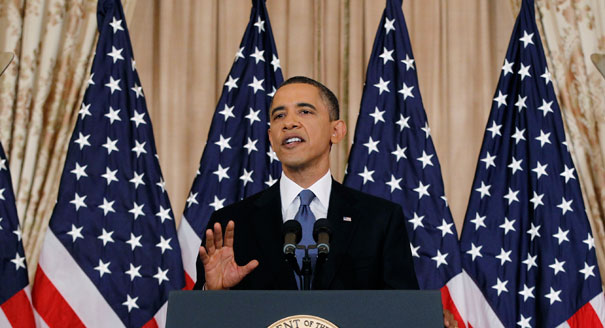Glenn Beck dedicated a good part of his radio program this morning to laying out his case that the Obama administration is directly responsible for the rise of ISIS, the establishment of the self-proclaimed caliphate and, by extension, the recent terrorist attacks in Paris.
Relying entirely upon one heavily redacted Defense Intelligence assessment from 2012 that was released back in May, Beck entirely misrepresented its findings to declare that the Obama administration sought to use Al Qaeda in Iraq, the precursor to ISIS, to foment a proxy war in Syria in order to topple the Assad regime and allow the creation of a “Salafist Principality” in Eastern Syria.
“Now, I want to make this very clear,” Beck said. “I’m charging that this president was the architect behind much of what was going on. I am charging that the president was not surprised by this at all. I’m charging that the president knew clearly these things would happen.”
“ISIS is the fruit of Obama,” he declared. “No good fruit can grow from a bad tree … In reality, they saw ISIS coming, they wanted ISIS to come. Would Paris have happened if we would have destroyed ISIS in the first place rather than contain them, rather than arm them, rather than coddle them? This president sowed these seeds. We are now reaping what has been sown by our own president. Do not allow him to plant any more seeds!”
Beck’s entire argument relies upon his false claim that these were “key goals” of the Obama administration when, in reality, the intelligence assessment asserted that these were merely “future assumptions about the crisis.” The assessment simply noted that the on-going Syrian civil war could evolve into a proxy war, with the Syrian regime getting support from Russia, Iran, and China; not that this was in any way the goal of the Obama administration, as Beck asserted.
In addition, the assessment noted that Syrian “opposition forces will try to use Iraqi territory as a safe haven for its forces” and that “if the situation unravels, there is the possibility of establishing a declared or undeclared Salafist principality in Eastern Syria.” Such an outcome was not, as Beck claimed, the administration’s goal. In fact, the assessment notes in the very next bullet point that such developments would carry the threat of “dire consequences” for the region by providing Al Qaeda in Iraq an “ideal atmosphere” to thrive and by giving it “renewed momentum,” which would represent a “grave danger” to efforts to unify and stabilize Iraq.








